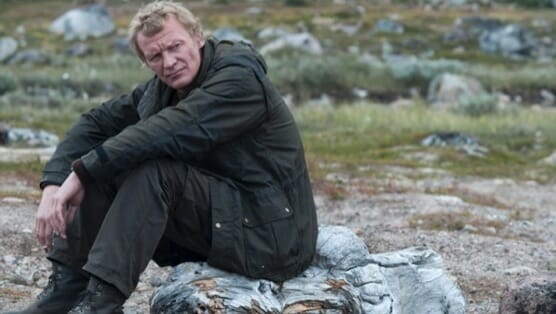Leviathan

In the Bible, Job suffers endlessly. God lets Satan take his children, his wealth and physically afflict him with no end in sight. It’s a test of faith, and a parable (or that rationalizing opium of the masses that Marx was so down on) as to why God allows such inequitable ills to wreak havoc on the faithful good. A similar ordeal faces the unfortunate Kolya (Aleksey Serebryakov) in director Andrey Zvyagintsev’s Leviathan. Kolya becomes the target of the corrupt mayor (Roman Madyanov, brilliantly conjuring up shades of Bob Hoskins in The Long Good Friday and current Russian President Vladimir Putin) in a northwestern Russian province, near the Finnish border. The unscrupulous magistrate desires Kolya’s land because of its strategic locale, situated between the sea and a broad waterway—and he’s more than willing to bend his official rule to legally wrest the holding.
Both steely and acquiescing, Kolya doesn’t seem to have a chance in the annexation process, especially given his best defense is self-contained, vodka-fueled rage—that is until a visit from his army mate from Moscow, Dmitri (Vladimir Vdovichenkov), now an attorney with a J. Edgar-style file of dirt on the mayor. Blessedly, Leviathan is not a courtroom drama, nor is Dmitri the crisp, clean savior he initially appears. The mayor also runs a goon squad on the side to do his bidding when the bureaucratic machinery does not move as fast as he would like, and as a result, some near-Goodfellas violence breaks out, but two of the most pivotal scenes—a molestation and a murder—take place outside the periphery of the lens. There is never any real rewind to provide a definitive “what happened,” the enigmatic weight of which tugs piquantly at the viewer’s orientation and sense of morality.
The Scriptures also contain the story about a leviathan that swallowed an imperiled soul by the name of Jonah. And while the film is dotted by a series of meta-theological interludes between Kolya and the village’s Orthodox Christian priest and the profound recurring imagery of whales and whale carcasses, Zvyagintsev’s Leviathan ultimately takes its cue from Thomas Hobbes’ book of the same name; Hobbes theorized that an effective, all-inclusive government must fairly address the needs of its lower social strata or risk overthrow. The folding in of the Job theme—where the hand of power, and its thumb on the throttle of torment, is not that of the Almighty but a “fair” and democratically elected stewardship that does not abide with the Creator’s embracing benevolence—blends both the biblical and Kafka-esque motifs seamlessly and provocatively.
-

-

-

-

-

-

-

-

-

-

-

-

-

-

-

-

-

-

-

-

-

-

-

-

-

-

-

-

-

-

-

-

-

-

-

-

-

-

-

-








































